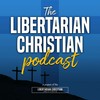

The Libertarian Christian Podcast
Libertarian Christian Institute
Join the Libertarian Christian Institute as each week they explore, debate, and analyze the issues that are directly relevant to the intersection of Christianity and liberty. Always thoughtful, frequently controversial, and never boring (trust us), it is our hope and prayer that The Libertarian Christian Podcast serve as a valuable resource to the Church for years to come.
If you'd like to reach out to us and ask a question or submit some feedback, you can reach us at podcast@libertarianchristians.com, as well as on Facebook, Twitter, and of course, our website, libertarianchristians.com.
If you'd like to reach out to us and ask a question or submit some feedback, you can reach us at podcast@libertarianchristians.com, as well as on Facebook, Twitter, and of course, our website, libertarianchristians.com.
Episodes
Mentioned books
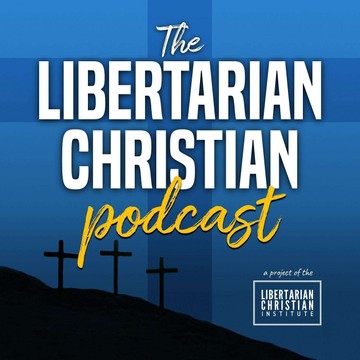
May 26, 2023 • 2h 27min
Ep 328: Faith & Firearms Debate: Can Christians Own Guns? with Dick Clark and Jerry Robinson
Should Christians use guns against other humans? Tune in to this episode of the Libertarian Christian Podcast and listen as Dick Clark and Jerry Robinson debate the ethics of violence and whether it's ever right for a Christian to own firearms. Audio Production by Podsworth Media - https://podsworth.com
★ Support this podcast ★
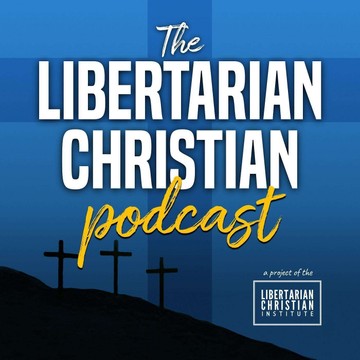
May 19, 2023 • 33min
Ep 327: Christianity in the Libertarian Party, with Angela McArdle
As both a devout Christian and Chair of the National Libertarian Party, Angela McArdle perfectly embodies the values of the Libertarian Christian Institute, existing at the intersection of Faith and politics. In this episode, Doug Stuart welcomes Angela as she walks us through her political and theological journey. Growing up in a Christian Missionary Alliance church, Angela shares how her upbringing not only shaped her spiritual beliefs but also her understanding of government and the state. Throughout her life, this Christian libertarian understanding persisted throughout Angela's life, informing her decisions as a litigator and as a political candidate. Today, they continue to inform her decisions in the Libertarian Party, which, as Angela explains, hasn't always been so welcoming to Christians. Following their discussion on Christianity in the LP, Doug and Angela move on to cover a range of topics, including Christian nationalism, the claim that "Jesus wasn't political," and the"remnant" from the book of Isaiah and its implications for modern Christians. Whether you're interested in any of these topics or just want more insight into the current state of the Libertarian Party, this episode is for you. Main Points of Discussion: 00:00 Introduction 02:26 Angela's libertarian youth 04:58 Church missions and government 07:58 Angela's journey from apologetics to partisan politics 13:42 The Libertarian Party & Christianity 20:04 Sharing the Gospel 23:22 Was Jesus political? 26:38 Angela's response to Christian nationalism 28:47 What is the remnant? 30:45 Lightning round: Secession, single-issue voting, Joe Exotic, & the LP Twitter account. Additional Resources: - Follow Angela on Twitter: @angela4LNCChair - Subscribe to Angela's Patreon Audio Production by Podsworth Media - https://podsworth.com
★ Support this podcast ★
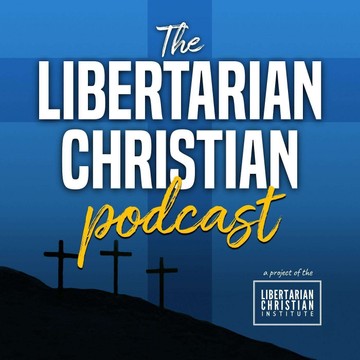
May 12, 2023 • 47min
Ep 326: Revelation's Call to Discipleship and Discernment in Today's World, with Scot McKnight
What if the book of Revelation wasn't just about predicting the future, but rather a guide for living faithfully in the present? In this episode, Doug sits down with acclaimed theologian Scott McKnight to discuss his intriguing new book, Revelation for the Rest of Us: A Prophetic Call to Follow Jesus as a Dissident Disciple. Together we explored how modern Christians misunderstand the book of Revelation. In our conversation, Scott and I delve into the dual critique of empire and Church presented in Revelation chapters two and three, exploring how 'Babylon creep' has influenced the Church and shifted its focus from living the way of the Lamb to living the way of Rome. We also discuss the importance of imagination in understanding Revelation's rich imagery and symbolism. Scot also reviews the 'Play Bill' of characters and events for readers to engage with. Most importantly, we examine the practical applications of Revelation using a 'Babylonian Hermeneutic,' identifying Babylon in our current world and its influence on the Church today. We discuss the dangers of partisanship, placing allegiance to America above Jesus, and the critique of economic exploitation. Don't miss this fascinating discussion as we explore the timely wisdom found in Scott McKnight's Revelation for the Rest of Us. Audio Production by Podsworth Media - https://podsworth.com
★ Support this podcast ★
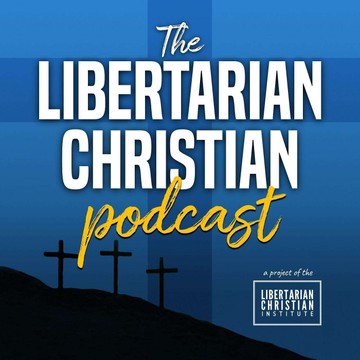
May 5, 2023 • 49min
Ep 325: Spring 2023 Reading Rundown, with Alex Bernardo
Though the Libertarian Christian Podcast may have a slight bias towards podcasts, we also love a good book. In this episode, host Doug Stuart and Alex Bernardo of the Protestant Libertarian Podcast sit down to talk about their reading habits and the books they've been enjoying recently, ranging from works of fiction like Harry Potter all the way to historical narratives about the Soviet Union. Whether you're looking for some quality book recommendations or just want to know more about the hosts and their approaches to reading, this is a delightful and laid-back episode you're not going to want to miss. Alex Bernardo is part of the Christians for Liberty Network and is the host of the Protestant Libertarian Podcast. There, he explores the intersection between protestant Biblical studies and libertarian philosophy, addressing topics related to theology, history, culture, economics, philosophy, and current events from both protestant and libertarian perspectives. More about Alex as well as links to all the books discussed in this episode can be found in the additional resources section below. Main Points of Discussion: 00:00 Introduction 01:45 Kindle, physical copies, & audiobooks 07:24 Highlighters or pens? 11:51 Doug and Alex's reading goals 19:25 Fiction books 32:24 Books that impacted Alex 38:40 What's Alex reading next? 40:14 Books that impacted Doug 44:11 What's Doug reading next? Additional Resources: - The Protestant Libertarian Podcast: libertarianchristians.com/shows/protestant-libertarian-podcast/ - Follow Alex Bernardo on Twitter: @ProLibertyPod - Fiction books: The Chronicles of Narnia series, by C.S. Lewis The Harry Potter series, by J.K. Rowling Amon's Adventure, by Arnold Ytreeide The Memoirs of Stockholm Sven, by Nathaniel Ian Miller Space: A Novel, by James A. Michener - Impactful books The Peril of Modernizing Jesus, by Henry J. Cadbury The Artist, the Philosopher and the Warrior, by Paul Strathern The White Pill, by Michael Malice - Next up: The Case Against the Fed, by Murray Rothbard Ideology and Insanity, by Thomas S. Szasz The Individualists, by Matt Zwolinski and John Tomasi Fossil Future, by Alex Epstein The Viking Heart, by Arthur Herman Roger Williams and the Creation of the American Soul, by John M. Barry Biblical Critical Theory, by Christopher Watkin - Other: Human Action, by Ludwig Von Mises Surprised by Scripture, by N.T. Wright Revelation for the Rest of Us, Scot McKnight Paul and the Faithfulness of God, by N.T. Wright The Crucifixion of the Warrior God, by Gregory A. Boyd Cross Vision, by Gregory A. Boyd The Witch Trials of J.K. Rowling, by The Free Press The Quest of the Historical Jesus, by Albert Schweitzer Audio Production by Podsworth Media - https://podsworth.com
★ Support this podcast ★
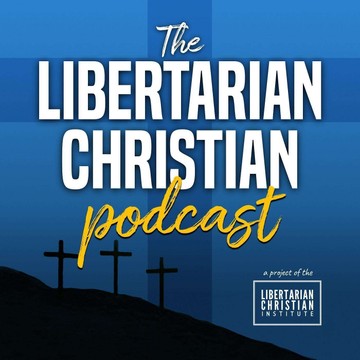
Apr 28, 2023 • 42min
Ep 324: Criminal Justice & Finding Freedom, with John Odermatt
In this episode of the Libertarian Christian Podcast, host Doug Stuart interviews John Odermatt, co-founder of the Lions of Liberty Network. John opens up about his journey towards becoming a leading advocate within the criminal justice reform movement, rooted in both personal experience and his Christian faith. His passion for the subject has been fueled by firsthand encounters with the injustices of the system, leading him to create and host the Felony Friday podcast, a platform that raises awareness about the issue and brings powerful stories of redemption from those affected. Odermatt's dedication towards reforming a broken system is a testament to the importance of addressing the consequences of crime in a restorative, compassionate manner. A major aspect of the conversation about criminal justice reform revolves around the necessity for compassion and grace. Whether discussing rehabilitation, reintegration, or individual struggles, understanding the importance of mercy and forgiveness is an integral part of any lasting solution. As Christians, this approach aligns with the core teachings of Jesus and underscores the value of treating others with respect, regardless of their past mistakes. For John Odermatt, compassion plays a significant role in his advocacy efforts. Through his podcast and personal interactions, he emphasizes that providing second chances and acknowledging the humanity of those who have been through the criminal justice system can open doors for healing and reintegration. Odermatt highlights that one's past should not dictate their future, and a system that embraces restorative justice can foster genuine growth and change. John Odermatt is a passionate advocate for criminal justice reform and libertarianism. He began his journey in the world of podcasting nearly a decade ago, and has since become a co-founder of the Lions of Liberty Network. With years of experience under his belt, John now hosts the popular Finding Freedom Podcast, where he interviews individuals who have faced the injustices of the criminal justice system, as well as those who have overcome adversity and found success after incarceration. Raised in a conservative Christian household, John's personal experiences and background in law have shaped his compassionate approach to reform and liberty. Main Points of Discussion: 00:00 Introduction 05:57 Pivoting to Finding Freedom 06:26 Criminal Justice Reform 12:28 Compassion and Responsibility 13:18 Growing in Faith 15:13 Taking Command of Our Liberty 19:10 Choosing Your Suffering 22:20 Overcoming Hurdles 23:43 Education in America 28:47 Libertarians during COVID 32:53 Technology and Tyranny 36:10 Resisting Sin and Oppression 39:42 Lions of Liberty Network 40:52 Conclusion Additional Resources: - Lions of Liberty Network: https://lionsofliberty.com/ - Finding Freedom Podcast: https://www.lionsofliberty.com/episodes - Interview with Jacob Winograd: https://www.lionsofliberty.com/episodes/christianity-and-liberty-with-jacob-winograd - Connect with John Odermatt on Twitter: https://twitter.com/JohnOdermatt - Lions of Liberty on YouTube: https://www.youtube.com/c/LionsofLiberty Audio Production by Podsworth Media - https://podsworth.com
★ Support this podcast ★
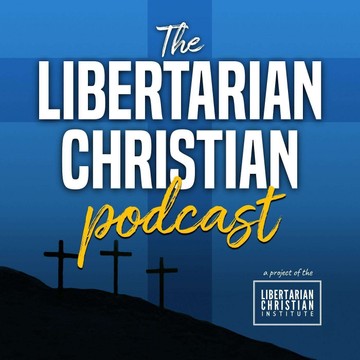
Apr 21, 2023 • 49min
Ep 323: Christian Gun Culture, with Jerry Robinson
In this episode of the Libertarian Christian Podcast, host Doug Stuart discusses the topic of faith and violence with Jerry Robinson, founder of True Riches Academy and host of True Riches Radio. Raised a Jehovah's Witness, Robinson eventually found his way to the gospel and now challenges Christians to think critically about their faith and the associated ethical implications. Together, Doug and Jerry take on the topic of "gun culture" in America, which Jerry suggests is contradictory to Christ's teachings on radical nonviolence. In addition to the rich discussion on the ethics of gun ownership and gun use, the conversation highlights the importance of understanding God's character despite the pervasive interpretative pluralism and hermetical difficulties of today. Jerry Robinson is the founder and executive director of the True Riches Academy and host of True Riches Radio, a podcast dedicated to challenging believers to think and thinkers to believe. Through the True Riches ministries, Jerry and his team seek to “educate, equip, and empower” followers of Christ through the creation and distribution of educational materials in a variety of formats including: podcasts, video teachings, and e-books. Since 2002, Robinson has served in both pastoral and lay leadership in the local church, has taught and lectured in a variety of Bible colleges, universities, and churches, and has preached and lectured around the world, including Europe and the East. He holds a degree in Economics from the University of Tulsa. Main Points of Discussion: 00:00 Introduction 04:31 From Jehova to Jesus 7:19 Faith and hermeneutics 12:44 Why do Evangelicals go against Christ? 17:37 What is "gun culture?" 21:42 The book of Revelation and Jesus' return 24:45 Extrabiblical prohibitions and prescriptions 30:38 Christians for Liberty Network plug 31:09 Romans 13: State sovereignty vs God's sovereignty 32:32 Good vs. evil 37:18 The only way to stop a bad guy with a gun... 43:52 Can guns be used as a last resort? 46:39 WWJD? Additional Resources: - TrueRichesRadio.com - https://www.youtube.com/@TrueRichesAcademy - Related episodes: --- https://libertarianchristians.com/episode/does-the-conquest-of-canaan-conflict-with-anarchism/ --- https://libertarianchristians.com/episode/ot-case-non-violence-matthew-curtis-fleischer/ --- https://libertarianchristians.com/episode/cross-vision-greg-boyd/ --- https://libertarianchristians.com/episode/jesus-bible-politics-brian-zahnd/ --- https://libertarianchristians.com/episode/loving-enemies-age-of-violence-ron-sider/ --- https://libertarianchristians.com/episode/pacifism-self-defense-christian-ethics/ --- https://libertarianchristians.com/episode/christian-pacifism-explained-ted-grimsrud/ --- https://libertarianchristians.com/episode/pacifism-prophecy-praxis-todd-lewis/ Audio Production by Podsworth Media - https://podsworth.com
★ Support this podcast ★
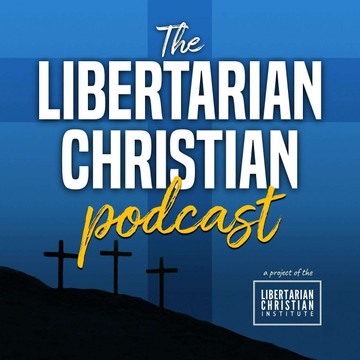
Apr 13, 2023 • 43min
Ep 322: Global Wealth & The Bourgeois Deal, with Art Carden
In this episode, Doug Stuart welcomes professor Art Carden to the show to discuss his book "Leave Me Alone and I'll Make You Rich: How the Bourgeois Deal Enriched the World." Co-authored by author Deidre McCloskey, the book looks at the history of the bourgeoisie and details the economic impact on global wealth. Art picks up on these concepts in his conversation with Doug, explaining in detail topics like "the Bourgeois Deal", "The Great Enrichment," "innovism," and many more. With roots in history, philosophy, economics, politics, culture, etc, this episode truly has something for everyone, so you won't want to miss it. Art Carden is a professor of economics at Samford University's Brock School of Business. He has worked with and contributed to a number of other organizations, including the American Institute for Economic Research, the Institute for Faith, Work, and Economics, the Beacon Center of Tennessee, the Independent Institute, and the Foundation for Economic Education. He received his PhD from Washington University in Saint Louis. More information can be found in the "additional resources" section below. Main Points of Discussion: 00:00 Introduction 03:15 Writing style analysis 04:55 What does "bourgeois" actually mean? 08:22 The Great Enrichment 10:43 Economic growth and the rule of 70 12:34 What about the poor? 14:49 Global wealth distribution 15:50 What is liberalism? 19:20 Christians for Liberty Network Plug 20:02 Capitalism vs "innovism" 23:02 The finer things in life 28:42 Billionaires and special interests 31:15 Salvation from sin: strategies for preaching the gospel 32:17 What is the "Bourgeois deal" and how does it benefit us? 38:02 Art's upcoming book "Strangers with Candy" Additional Resources: - Leave Me Alone and I'll Make You Rich: How the Bourgeois Deal Enriched the World - https://www.amazon.com/Leave-Alone-Ill-Make-Rich/dp/022673966X - https://press.uchicago.edu/ucp/books/book/chicago/L/bo61545999.html - https://www.goodreads.com/en/book/show/51941581 - Art's website: https://artcarden.com/ - Follow Art on Twitter: @ArtCarden - More from Art: -- https://papers.ssrn.com/sol3/cf_dev/AbsByAuth.cfm?per_id=508839 -- https://www.aier.org/people/art-carden/ - Our World In Data Audio Production by Podsworth Media - https://podsworth.com
★ Support this podcast ★
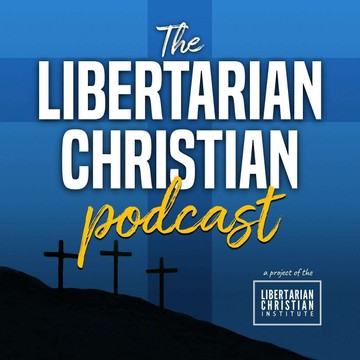
Apr 7, 2023 • 1h 6min
Ep 321: Why Christianity and Libertarianism Makes Sense, with Alex Bernardo
Like everyone else, we here at LCI enjoy a good crossover episode. Tune in to this installment of the Libertarian Christian Podcast to hear Doug Stuart talk with Protestant Libertarian Podcast host Alex Bernardo about Christianity, libertarianism, and the relationship between the two. Doug and Alex speak to the fundamental compatibility between Christianity and libertarianism, explaining how they came to be libertarian Christians and what kind of impact that's had on their lives. The two move on to contemporary strategies on how to sell libertarianism to Christians, as well as how to effectively evangelize to libertarians. Whether you're interested in these strategies or want to know more about Doug, critical theory, or the behind-the-scenes of this podcast, tune in today! Alex Bernardo is part of the Christians for Liberty Network and is the host of the Protestant Libertarian Podcast. There, he explores the intersection between protestant Biblical studies and libertarian philosophy, addressing topics related to theology, history, culture, economics, philosophy, and current events from both protestant and libertarian perspectives. More information can be found in the additional resources section below. Main Points of Discussion: 00:00 Introduction 07:10 Doug's spiritual journey 14:10 The influence of academia 19:16 Doug's libertarian journey 22:18 Joining LCI 24:05 How to name your podcast 25:40 What's the process for picking guests? 32:04 What is the relationship between Christianity and libertarianism? 38:44 Strategies for explaining libertarianism to Christians 40:35 Strategies for evangelizing to libertarians 42:46 Christians for Liberty Network plug 43:35 Freedom Fest and Christianity 47:46 Influential libertarians 50:18 Critical theory (in a nutshell) 57:43 Cultural implications of critical theory Additional Resources: - The Protestant Libertarian Podcast - Follow Alex Bernardo on Twitter: @prolibertypod - Turn Neither to the Right Nor to the Left, by Eric Schansberg - Missional Theology, by John Franke - The Third Temptation, by Austin Rogers Audio Production by Podsworth Media - https://podsworth.com
★ Support this podcast ★
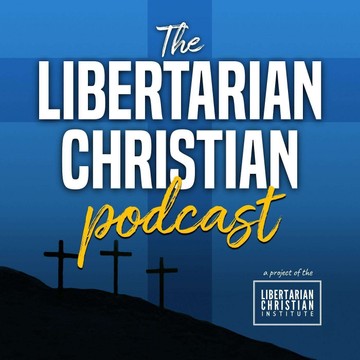
Mar 31, 2023 • 58min
Ep 320: Film and Freedom, with Silver Screen Biases
In this episode, Doug Stuart is joined by the hosts of the Silver Screen Biases podcast, Jeff and Nelson. After explaining their process for picking which movies to cover and how they deal with spoiler alerts, the hosts of SSB move on to discuss a number of fascinating film topics with Doug: what is the difference between film and entertainment? Is there such a thing as a libertarian movie? How has the rise of streaming services impacted cinema and storytelling more broadly? For answers to these questions and many others, tune in to this exciting episode today. In their own podcast, Jeff and Nelson sit down every two weeks to discuss a critically acclaimed movie and the truth claims made within it, as well as to wrestle with their own biases and analyze those of Hollywood. See additional resources if you want more from Silver Screen Biases. Audio Production by Podsworth Media - https://podsworth.com
★ Support this podcast ★
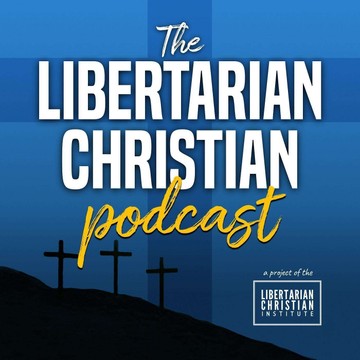
Mar 24, 2023 • 46min
Ep 319: Modern Villains, with Connor Boyack
In this episode, author Connor Boyack joins Doug Stuart to discuss the latest edition in the well-known Tuttle Twins book line. "The Tuttle Twins Guide to Modern Villains" highlights the nastiest villains throughout recent history, with notable figures including Adolf Hitler, Karl Marx, and Woodrow Wilson. If you're interested in knowing why Connor chose the villains he did or if you just want to know more about the background and writing process of the Tuttle Twins series, this is the episode for you! Connor Boyack is the founder of the Libertas Institute and has authored nearly 40 books, including the Tuttle Twins series, which has sold over 4.5 million copies. Connor graduated from Brigham Young University and has since been named one of Utah’s most politically influential people by The Salt Lake Tribune. Audio Production by Podsworth Media - https://podsworth.com
★ Support this podcast ★


